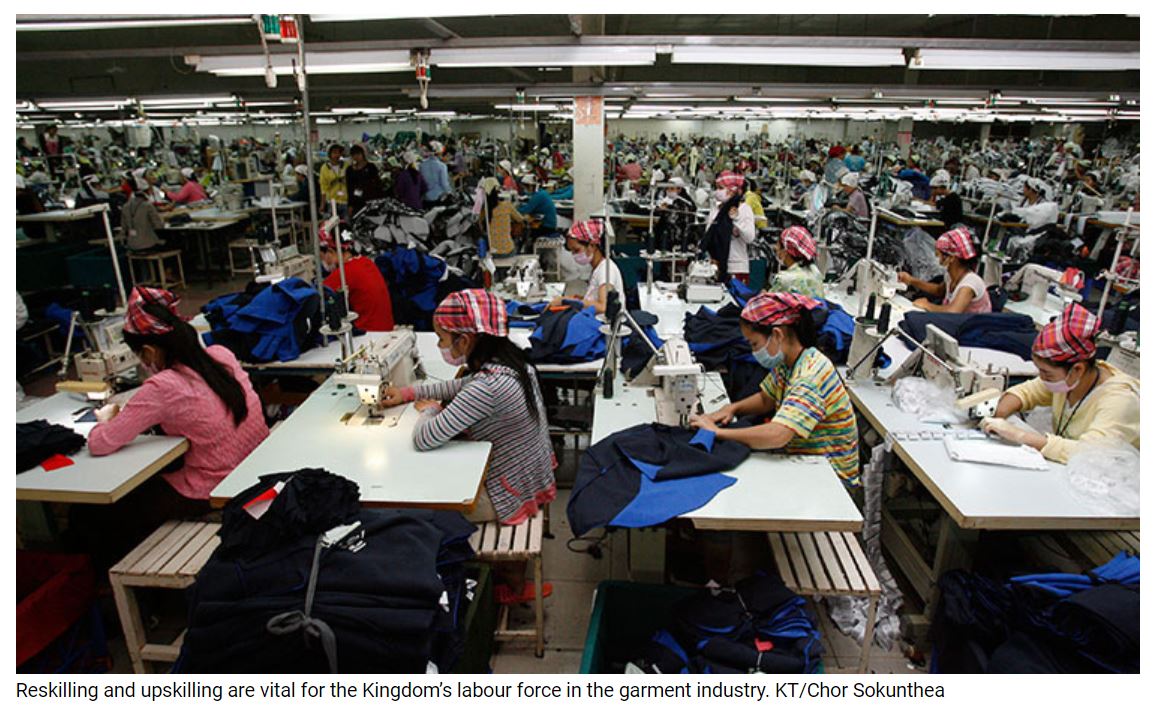Cambodia: Nine in ten workers hardly attend upskilling programmes
Close to 95 percent of the workers hardly attend reskilling or upskilling programmes within the labour-intensive garments, footwear and travel goods sector, according to a survey report released by the Cambodia Development Resource Institute.
The report highlights the need for skill development of the workforce to help achieve the goal of moving up the value chain to higher value-added products as well as to enhance the workers’ capabilities in accessing better and higher-paying job opportunities.
“Despite the availability of the training courses, most surveyed workers (95.7 percent) did not attend the training. Lack of information (26.4 percent), being occupied with work and family matters (24.6 percent), and no relevant training courses (15.1 percent) are some of the main reasons for not attending,” the report said.
“Having insufficient time due to work and family matters to attend the training is often cited as the reason among female respondents compared to a lack of information about the training courses reported by their male peers,” it added.
The Kingdom is all set to start implementing a massive reskilling and upskilling project with the support of the World Bank in 2024 for which the bank has proposed an allocation of $40 million. It is learnt that a number of training institutions (TIs) and job centres (JCs) will be set up across the country under the project.
According to the Ministry of Labour and Vocational Training, the ‘Cambodia Skills for Better Jobs Project is expected to benefit the poor and bottom 40 percent of society in building capabilities and skills, allowing them to obtain better jobs with higher earnings.
The primary project beneficiaries are individuals in the upcoming and existing workforce in Cambodia who enroll or complete vocational training and seek opportunities for better jobs, said the draft ‘Stakeholder Engagement Plan,’ released by the ministry.
“Both the upcoming workforce and the existing workforce will have access to the training programmes and labour market services supported by the project. The beneficiaries will have a choice to take skills assessment and receive certification at various levels, enabling them to secure jobs in higher value chains and improve their earnings,” it said.
The country also launched the ‘Closing the Skills Gap Accelerator,’ a public-private partnership with the support of World Economic Forum, and became part of a global network of 36 countries.
The initiatives are significant for the country to achieve its targets of becoming an Upper Middle-Income Country by 2030 and a High-Income Country by 2050.
According to various studies, only 70 percent of Cambodia’s 300,000 youth joining the workforce every year have the elementary school passing qualification while only 20 percent have the high school passing qualification.
The study indicates the enormity of the task at hand for the Kingdom as macro trends including the green transition, ESG standards and localisation of supply chains are to create new jobs in the next five years.
Speaking to Khmer Times, a leading economist with a United Nations subsidiary organisation in the country said without successful reskilling and upskilling initiatives among the labour force, Cambodia can’t fully benefit from the ongoing reconfiguration of supply chains.
“Cambodia is one country, which is going to benefit hugely from the successful reconfiguration of the regional supply chains. And if the skills shortage crisis continues, the Kingdom’s neighbours that have invested well in reskilling and upskilling will steal the day.”
Source: https://www.khmertimeskh.com/501323888/nine-in-ten-workers-hardly-attend-upskilling-programmes/


 Thailand
Thailand




